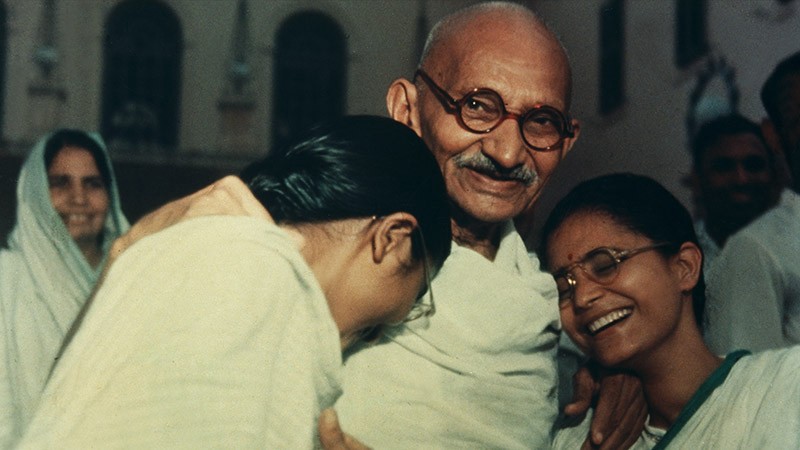The dark side of Gandhi: racism and questionable sexual practices.
By JustAnnet
ahatma Gandhi is remembered by many as a 20th-century symbol of non-violence. He was born in Porbandar, India, studied law, and organized boycotts against British institutions in peaceful forms of civil disobedience. Furthermore, he led India’s non-violent independence movement against British rule and advocated for the civil rights of Indians in South Africa during the apartheid era.
Gandhi’s advocacy for peaceful change was world revered. Despite this Gandhi died not having been awarded the Nobel Peace Prize, a prize awarded to individuals who have done the most or the best work for fraternity between nations, for the abolition or reduction of standing armies, and the holding and promotion of peace congresses
Gandhi was nominated for a Nobel Peace Prize several times but never won the award. Did the Nobel Committee know something that we didn’t?
The Nobel Committee has subsequently expressed regret over not awarding Gandhi with the distinguished Nobel Peace Prize. But, was the Nobel Committee right in snubbing Gandhi the Nobel peace prize? This is the question this article aims to answer by revealing some of the less talked about traits that Gandhi exhibited throughout his life.
Was Mahatma Gandhi a racist?
Between 1893 and 1915, Gandhi led the civil rights movement in South Africa. He was particularly aggravated when he was thrown out of the first-class while on a train in South Africa. The first-class was reserved for Caucasian travelers at the time. Unlike many popular civil rights activists of that time, Gandhi was not troubled by the fact that he could not sit with White people in first-class — instead, he was mostly offended by the fact that he had to sit in the economy section with Black people. Gandhi’s loathing of Black people is further evidenced by the comments he made at various gatherings. He was quoted in the 1908 Indian Opinion saying,
“Kaffirs [derogetory term historically used to describe Black people in South Africa] are as a rule uncivilised — the convicts even more so. They are troublesome, very dirty and live almost like animals.”
During his time in South Africa, Gandhi devoted his time to fighting for the rights of Indians at the expense of Black people’s rights. He believed that racial division was justified but he strongly advocated for Indians to be considered more important than Black people but lower than the White South Africans.
Gandhi refused to use violence to achieve this instead he made use of non-violent ways to convince South Africa’s white politicians that Indians were better than Black South Africans. He was an educated man who used his words to uplift Indians to the detriment of Black South Africans. During an address in Bombay in 1896, he infamously said,
“Ours is one continual struggle against a degradation sought to be inflicted upon us by the Europeans, who desire to degrade us to the level of the raw Kaffir whose occupation is hunting, and whose sole ambition is to collect a certain number of cattle to buy a wife with and, then, pass his life in indolence and nakedness.”
The comments made by Gandhi about Black South Africans show the world that he was disgusted by Black people. How Gandhi was once revered as a symbol of peace in the world is quite shocking! His general disregard for Black lives should not be ignored. Celebrating his life would be tantamount to endorsing the beliefs he had about Black people.
Gandhi’s strange sexual practices
Gandhi believed that he was a lustful human being. He hated this about himself. In 1885 Gandhi left his father to die while he engaged in sexual activities with his wife. It seems that this haunted Gandhi and fuelled his drive to remain chaste in the future. Ultimately Gandhi took a vow of chastity, a vow he considered crucial in enabling him to serve the world as opposed to chasing his sexual desires.
Chastity in itself is not strange, many religious people choose to remain celibate. Celibacy has been proven to increase an individual’s focus on the important tasks at hand. Therefore, one can understand Gandhi’s need to stay celibate.
Gandhi’s need to remain celibate led to the development of some awkward behaviours that would be greatly frowned upon today. It has been reported that in an attempt to test his chastity Gandhi shared a bed with young girls. His entourage consisted of many young women whom he would bathe with and exploit in various seemingly sexual ways.
One could argue that these women chose to follow and serve Gandhi and as a woke society we must accept that those women had a right to choose to serve Gandhi as they saw fit. It is hard to ignore the position of power and influence Gandhi exerted on many people. As such it is justified to question whether the women who served Gandhi would have done so had he not been as powerful as he was.
An interesting question posed by an article that questioned Gandhi’s sexual activities is, “if Gandhi was alive today, would he have survived the #MeToo movement?”
By answering the above question we can see that the squeaky clean image that most people have about Gandhi may be false. Unfortunately, people did not speak out against some of Gandhi’s repulsive behaviours. One could argue that it was a different time, a time when racism and sexual abuse were the norm rather than the exception. But, whether that argument is enough to exonerate Gandhi is debatable.
Gandhi also made some questionable friendships that included Hitler and Mussolini. Many have highlighted that because Gandhi could be friends with such evil men it is a testament to his character. However, on the flip side of the coin, one could argue that these friendships were a way for Gandhi to foster peaceful relations that would ultimately benefit humanity as a whole.
In conclusion, whether you love him or hate him Gandhi was a paradoxical man, a simultaneous symbol of peace for some and hate for others. The Nobel Peace Committee may have secretly been aware of these contradictions which would have rendered Gandhi unworthy of the prestigious Nobel Peace Prize.
Source: https://historyofyesterday.com/this-is-what-nobody-tells-us-about-mahatma-gandhi-98b53b59271d








